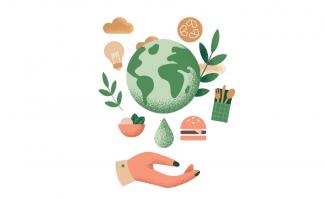Food strategies that protect our planet

In almost every diet and nutrition article, readers learn about the importance of what goes on their fork and how it can impact their health. But in addition to that, the foods we consume have a profound impact on the future of our planet. If we think about it, the food system is responsible for more than one-quarter of earth’s global greenhouse gas emissions, and it takes up over 40% of the planet’s ice-free, desert-free land to grow food to feed the world. The process of putting food on your plate produces pollution, uses up fresh water and other natural resources, and threatens our beautiful planet earth with loss of wildlife and ecosystems, as we move more and more of our natural spaces into agriculture.
That is a lot to take in, isn’t it? However, there are many things we all can do every day to lessen our personal impact on the planet. And YES, it can start with your diet. Let’s review some ways to make a difference on our eco-footprint as an individual.
Reducing Food Waste. This is a big one. Wasting food has an enormous negative impact in the environment. To change this, you can plan your meals and include 1 or 2 days for leftovers. You can create great meals if you get creative with them. Shop in your own fridge first and avoid over-buying. Another great tip is to use every part of your produce.
Eat Mindfully. This will help with over-eating which also wastes food. Tuning into your body will help you consume only what your body needs. It also creates intention, which allows you to fully appreciate your meal and how it’s nourishing you.
Shopping. I understand we are busy, and time is short. Instead of going to the store once a week, try shopping two or three times a week. This helps you to buy only what you need for two days at a time, resulting in a decrease in food waste and less garbage in our landfills.
Composting. Fruits and vegetables, leftovers, peelings and rinds can all be easily gathered into a composting bin and made into a very useful fertilizer for home gardening.
Freezer. Freezing ripe fruit and veggies before they go bad will help you save money and reduce waste. You will also be able to have something to enjoy when they are out of season.
Shop Local. Try to purchase more foods that are grown closer to home to reduce the amount of time food has to travel to get to your plate. This strategy will benefit your local economy and save you time and money as well.
